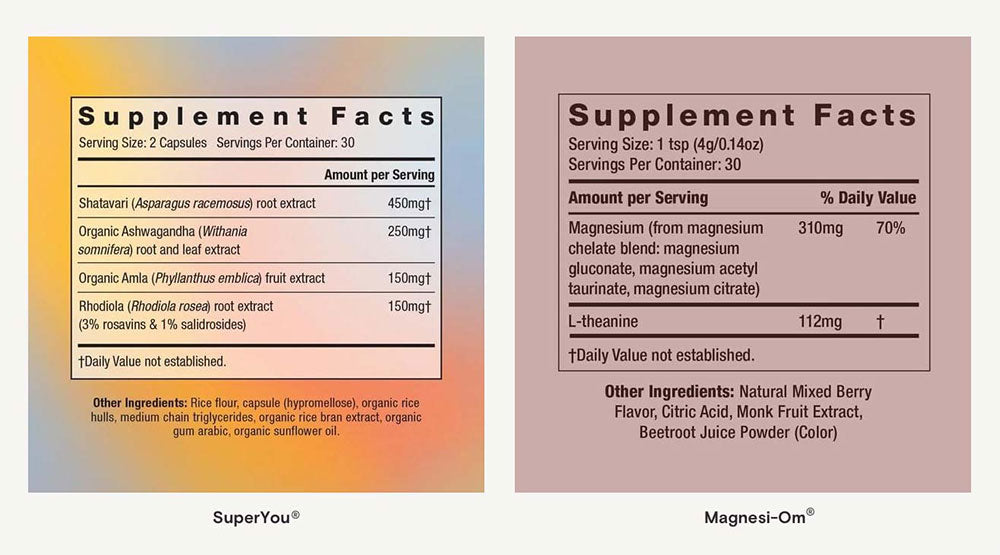We Tried All of Moon Juice’s Best Sellers—These Are the Best Ones



- EMAILSHARE
@moonjuice/Design by Cristina Cianci
With a wide range of product offerings such as matcha latte mixes, protein powders, and best-selling adaptogens known as Beauty Dust, Brain Dust, and Sex Dust, Moon Juice has transformed how many people incorporate wellness into their daily lives. Naturally, you’re likely wondering if wellness products such as these are worth the hype. Read on for everything you need to know about Moon Juice and learn just how impactful the brand has become in a short period of time.
Founded: January 2011 in Venice, California by Amanda Chantal Bacon
Location: Los Angeles, CA
Pricing: $7- $65
Best Known For: Natural supplements, powders, and food, along with skincare products that nourish and help heal the body.
Holy Grail Product: SuperYou and Acid Potion
Fun Fact: The Moon Juice shops are like a coffee bar, candy store, and apothecary all-in-one. You can leave with a Strawberry Milkshake, supplement for stress management, liquid exfoliator, or a Sex Dust Latte.
Other Brands You’ll Love: Goop, Sakara Life
Whether you’ve invested in a personal wellness journey for many years or are just getting started, the philosophy behind Moon Juice is very approachable for anyone wanting to better their health daily. “Moon Juice bridges the world of alchemy and biology for functional benefits,” says founder Amanda Chantal Bacon, who opened her shop in Venice, California nine years ago, “The purity of ingredients is always at the core of everything we do, and Moon Juice is a place for everyone no matter where you are in your journey.” For Bacon, who was confronted with an autoimmune condition and told remission wasn’t possible, Moon Juice is more than just a business.
After fervent research and making impactful changes in her lifestyle and diet, Bacon found that her symptoms began to get improve over time, inspiring her to dig deeper in her journey. In 2011, Bacon launched Moon Juice from her kitchen and, since, it’s grown to be one of the most sought-after wellness brands on the market today.
Whether you’re looking for stress relief or a better night’s sleep, Moon Juice offers consumers a way to relax and heal their bodies with high-quality, potent products. Customers from all walks of life can experience the benefits Moon Juice products have to offer. The ingredients include several different types of adaptogenic proteins and herbs (the popular and powerful Ayurvedic herb Ashwagandha being one), along with a bevy of Supershrooms and more.
Here’s more about some of the best products Moon Juice has to offer.
My well-being doesn’t live and die on a beautiful gradient hill stacked high with SuperYou bottles, but for me, this product definitely doesn’t hurt if I’ve got a little extra money to spend on self-care for the month.
— Michelle Pellizzon
Moon Juice has been playing with herbs and adaptogens (and our aesthetically-inclined hearts) for some time now.
Who doesn’t get weak in the knees at the promise of super focus, super silky hair, super sex, super beauty, and super energy by just sprinkling a bit of stevia-sweetened dust in your morning drink of choice?
The efficacy of its ingredients continues to be a piping hot tea-time topic, rife with mixed fee-fees. [Yet we couldn’t help but side-eye when seeing that in 2016, a third-party investigation by the BBB National Board put Moon Juice on blast for insufficiently substantiating the advertized claims of their products (namely their Dust line). Following the NAD inquiry, Goop.com quietly removed Moon Juice’s herbal products from its site and has yet to restock them since 👀]
We’re not pretending to be above good marketing or quality ingredients that create results, but we’re here to question . at what cost?
No, literally — if this is $49 a bottle and it only lasts 30 days, these dusty little capsules better work.
Source: Bangalore, India
SuperYou ® in the AM and Magnesi‑Om ® in the PM mitigate stress chemistry for energy, mood, relaxation, and brain health.*
 The first day I took SuperYou, I felt calmer than usual. I actually forgot I had taken it and was wondering why I was feeling so relaxed. Or maybe I was tired? I couldn’t figure it out. Then, I remembered I had taken SuperYou that morning. I guess it was working, and quickly!
The first day I took SuperYou, I felt calmer than usual. I actually forgot I had taken it and was wondering why I was feeling so relaxed. Or maybe I was tired? I couldn’t figure it out. Then, I remembered I had taken SuperYou that morning. I guess it was working, and quickly!
The Verdict
When I finished my SuperYou supply at the end of my 30 day trial, I felt pretty great, in large part because I felt like I did a good, consistent thing for myself and my body. Did I think SuperYou made all my anxiety and stress go away? No. But I think it certainly helped. And while I didn’t see a huge difference in my skin either, I believed that all the antioxidants were doing their work underneath the surface.
If you’ve been thinking about getting into the buzzy world of adaptogens, but are unsure where to start, Moon Juice’s SuperYou could be a great introduction. It’s simple, straightforward, and has very subtle effects (or at least I thought so). And at the end of the day, who couldn’t use an assist in the stress management department, no matter how small?
The combination of the different active agents in each supplement poses another concern, according to Cheng. He said that even if each active ingredient was independently proven to operate as suggested, this does not mean that a mixture of the drugs will have the desired combined effects.
Yale scientists skeptical of herbal supplements
A slew of herbal supplements brings promises of reduced stress and increased energy. The efficacy of the supplements — which have not been evaluated by the FDA — is unknown.
The supplements, such as SuperYou by Moon Juice and Big Chill by HUM, have been released over the past few years by several vitamin brands. While each supplement has a different makeup, most of them rely on a series of active agents that the companies claim can manage stress, support hormonal balance, reduce fatigue and boost energy. Several Yale experts weighed in on — and were largely skeptical of — the common supplements’ effectiveness.
“I think most of the claims are unsubstantiated,” said Yun-Chi Cheng, a professor of pharmacology at Yale and the chairman of the Consortium for the Globalization of Chinese Medicine.
Although the companies list the traditional use and intended purpose of each active ingredient within the supplement, the companies give no evidence that supports the advertised functions.
Ashwagandha, one of the more common active agents in the supplements, is cited as a drug that helps to manage anxiety and lower cortisol levels. According to Cheng, there is no evidence to support the claim that ashwagandha has anti-inflammatory properties, which are responsible for decreasing anxiety. Cheng said that there is likewise little substantial research that suggests ashwagandha lowers cortisol levels. The drug has, however, been recommended by the Indian government as an effective drug for prevention of COVID-19, according to Cheng.
Another drug used in the supplements is extracted from rhodiola, an herb also known as arctic root or golden root. The herb is harvested from the Altai Mountains of Siberia. SuperYou claims that it is “used in Chinese medicine to replenish energy and enhance mental function.”
Rhodiola is traditionally used in China to treat altitude sickness, but Cheng said that there is very little evidence showing that it can boost energy. While there are studies that suggest rhodiola can effectively decrease physical and mental fatigue, Cheng said the studies were found to be heavily influenced by bias.
Along with providing little evidence to substantiate their claims of the drugs’ effectiveness, the vitamin companies also do not indicate any side effects the active agents may cause. Some of the compounds, however, may have adverse effects of which the companies do not inform consumers.
Another drug found in the supplements, for example, is shatavari, a root found in Northeastern India. SuperYou claims that the extract helps to balance hormones and enhance sexual drive. It does not list any side effects.
Shatavari is famous in India for strengthening female fertility, Cheng explained. While increased fertility may not be viewed as a drawback for all consumers, he said that it is certainly an important possible side effect that is omitted in the drug’s marketing.
“Shatavari has a structure that is very similar to steroids and bodybuilding supplements, such as cholesterol,” said Jenny Martinez, a former organic chemistry preceptor at Yale and current instructor at New York University.
Steroids work by reducing immune system activity. Though vitamin brands do not mention it, a possible side effect of shatavari is a weakened immune system, according to Martinez.
The combination of the different active agents in each supplement poses another concern, according to Cheng. He said that even if each active ingredient was independently proven to operate as suggested, this does not mean that a mixture of the drugs will have the desired combined effects.
The composition of the supplements may also change every time the compounds are harvested. Even a slightly altered composition could affect the efficacy of the supplements and cause inconsistent results, according to Cheng.
According to Martinez, the lack of evaluation and testing of the supplements causes ambiguity surrounding the potential benefits and dangers of the drugs. There is no explicit evidence that shows negative or positive effects of the supplements. Therefore, Martinez is suspicious of the safety of the drugs.
“I think there is a process for a reason, and I personally wouldn’t trust something that hasn’t gone through the entire process and gotten the final stamp of approval,” Martinez said. “It makes me uneasy as both a consumer and a scientist that there is no actual evidence to back up these claims.”
Kelly Smart, a postdoctoral associate in pharmacology at Yale, agrees that there could be dangers to taking these supplements. However, she is not willing to completely write them off, believing they may have benefits as well.
Neither the benefits nor the risks are definite, according to Smart.
“I don’t discount herbal or traditional medicine and I’m not saying we need to avoid every substance that isn’t marketed by a big pharmaceutical company,” Smart said. “But because the risks are real I think some skepticism is in order.”
Regardless of their lack of scientific support and possible safety concerns, the supplements have been receiving mostly positive feedback from customers. SuperYou has 1,168 reviews with an average rating of 4.8 out of five stars.
I wasn’t happy with the results so I did something you might call “extreme”.
The Bottom Line
Clearly, the Moon Juice brand has been incredibly successful over the last decade, and to be honest, I think that’s probably more due to the brand’s aesthetic and the growth in the herbal wellness market rather than the quality of the supplements the brand is selling.
It’s not necessarily that I think SuperYou is bad, but the results from consuming these capsules seem to vary drastically from person to person.
So, I would say that it’s difficult to leave a balanced review of SuperYou – it might work for you and change your life for the better, or it might not.
Personally, I don’t think that I would be spending money on stress-relieving capsules. Instead, I would take a super greens formula with adaptogenic herbs within it, so I was getting better value for money and receiving a nutrient boost at the same time.